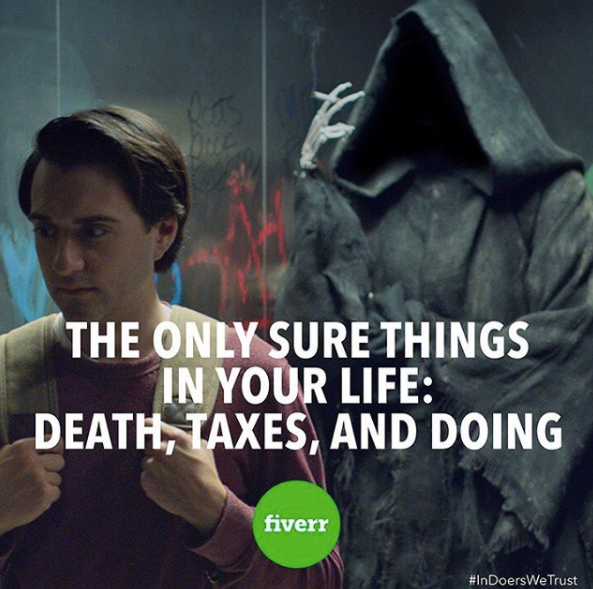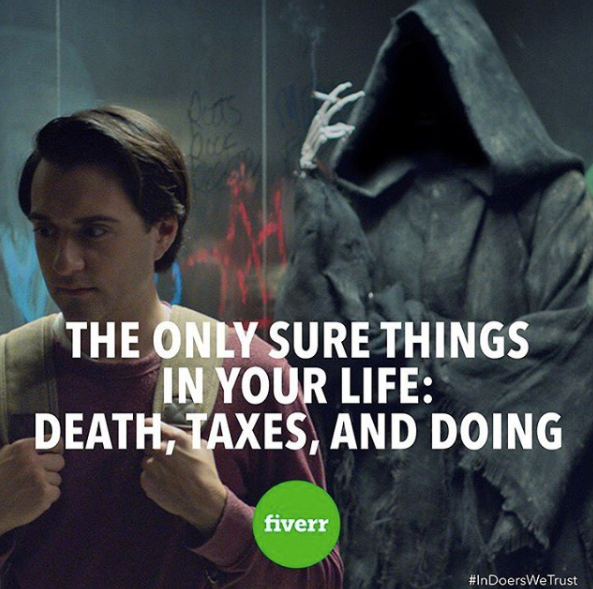
If you spend a lot of time reading BuzzFeed articles, like I do, you have probably seen a horrifying article called “11 Words That Mean Something Completely Different To Side-Hustlers.” The thesis of the Samsung-sponsored post is that so-called side hustlers never relax, monetize all their hobbies, employ their friends as “freelance assistants” and use their weekends to “work freely,” whatever that means. This paean to late-stage capitalism is delivered in the form of cute little animated GIFs of smiling people eating sandwiches while frantically typing, and working while the sun rises and sets outside their window. Isn’t it fun to work every moment until you die?
Of course, this listicle isn’t breaking any new ground. A recent New Yorker piece discussed the PR and ad campaigns of gig-economy startups Lyft and Fiverr, which, respectively, feature a driver picking up a new passenger while actively in labor and an entrepreneur answering a call from a client during sex (“always be available”). The Fiverr ad also features an exhortation to “beat the trust-fund kids” and the “tech bros,” which is ironic, considering that Fiverr is no doubt funded and staffed almost entirely by tech bros, people with trust funds or both[1]. And back in the relatively halcyon days of 2015, a cheery infographic from Microsoft went viral for touting their products’ ability to help you get work done outside the office — for example, while going to the bathroom, visiting a national park, watching your kid’s soccer game or going out for dinner at a restaurant.
This paean to late-stage capitalism is delivered in the form of cute little animated GIFs of smiling people eating sandwiches while frantically typing, and working while the sun rises and sets outside their window. Isn’t it fun to work every moment until you die?
But, of course, you have to work 24 hours a day when you make, as workers on Fiverr do, $5 for a single task or the less than $5 per hour that most workers on Amazon’s Mechanical Turk platform earn. And although Uber once claimed that the typical driver took in more than $100,000 a year, a freelance writer who started driving for Uber earned $118 for 11 hours of work (or just under $11 an hour) … but that was before she deducted the cost of gas, insurance and wear and tear on her vehicle. Another Uber driver went back to work six days after giving birth but still ended up owing Uber about $2,000. Even the satisfied members of the gig economy have to make sacrifices to make ends meet, like the San Francisco woman who does graphics consulting for Stanford and Code for America, among others, but who sells prized collectibles on eBay and whose preschool-teacher husband babysits three nights a week. And remember—all these drivers and entrepreneurs and TaskRabbits are contractors, not employees, which means they don’t get the job security, health insurance, sick leave, maternity leave or paid time off that make traditional minimum-wage jobs survivable.
Maybe some people really do enjoy living this way. Maybe the pregnant Lyft driver was thrilled to have a stranger accompany her during part of her trip to the hospital, and maybe your aunt would prefer to be selling her embroidered handkerchiefs on Etsy instead of giving them to her ungrateful relatives. I’m not here to talk smack about people who work multiple jobs — I technically have three jobs right now, plus a smidgen of freelancing. But they’re all part-time, and I’m still in college, and theoretically I’d like to have a job one day that offers me the relative luxuries of maternity leave and health care. Plus, if I ever tried to monetize my knitting hobby, the North American lopsided-hat industry would never recover.
Silicon Valley companies don’t just expect their contractors to work through contractions. Their corporate cultures also espouse the same values: work hard and don’t expect benefits. A recent BuzzFeed exposé revealed that Uber engineers who didn’t respond immediately to crises, even if they occurred during weekends or in the middle of the night (or both), were shamed in company-wide emails. And non-tech workers are even worse off: while most Facebook employees enjoy free dry cleaning, food and health care, food-service workers are barred from the health clinics that other employees use and are paid so poorly that two cafeteria workers are currently living in a garage with their three children. I wonder how long it will be until that gets made into a “fun” ad.
I’d like to have a job one day that offers me the relative luxuries of maternity leave and health care. Plus, if I ever tried to monetize my knitting hobby, the North American lopsided-hat industry would never recover.
Companies have realized that they can offer incredibly cheap prices for their services by using legal loopholes to pay their “contractor” employees a pittance while offering zero benefits or employment protection. But even with that, lots of these start-ups, even the big ones, are hemorrhaging money, surviving only on funding from indulgent investors willing to make a bet that they’ll eventually turn a profit. Eventually, that seemingly bottomless well of money is going to dry up, and companies will move on to their latest tactic: asking freelancers to work for “exposure” instead of money. And when notoriously left-leaning workplaces like the Village Voice have started union-busting, even organized labor might not be able to save us from our work-filled futures.
[1] When I looked up the founders of Fiverr to check that I wasn’t being unfair, I was briefly excited by the prospect that one of its founders was a woman. But no, it turns out that Micha Kaufman is a white dude too.







